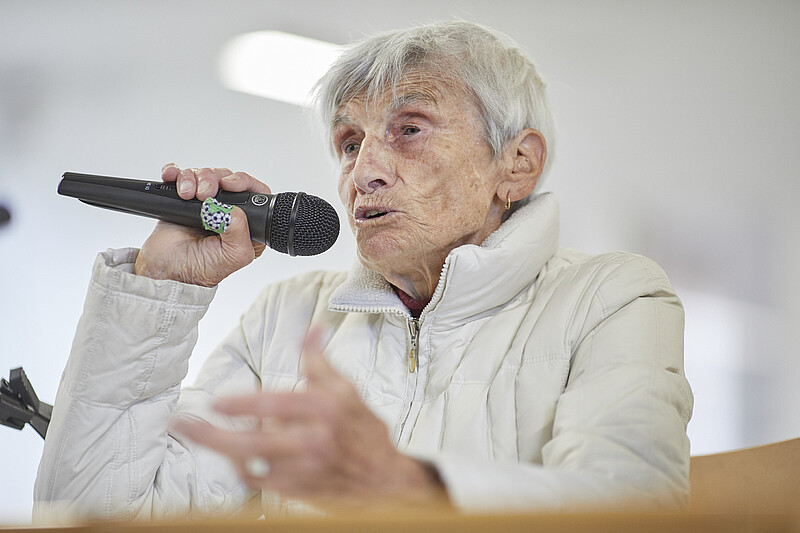MARGOT HEUMAN, born on this date, (d: 2022) was a German-born American Holocaust survivor. As a lesbian, she was the first queer Jewish woman known to have survived Nazi concentration camps.
When Heuman was ten years old, she and her younger sister were expelled from public school for being Jewish. In 1942, the Heumanns were sent to Theresienstadt Ghetto. In her youth home in the ghetto, Heuman met an Austrian girl named Ditha Neumann, and the two began a secret intimate relationship. In 1943 or 1944, both the Heumann family and Neumann were taken to Auschwitz. Heuman chose to participate in the selection for forced labor in order to stay with Neumann. As a result, she did not see her parents or sister again; they are believed to have been murdered at Auschwitz.
The group of women selected for forced labor were taken to Neuengamme concentration camp, where Heuman and Neumann slept together in the barracks and engaged in sexual barter with men to obtain food. In April 1945, the Schutzstaffel shut down Neuengamme and the Jewish women were sent to Bergen-Belsen concentration camp. I April 1945, Heuman was freed from Bergen-Belsen concentration camp by British soldiers. After spending two years in Sweden and attending school, she moved to the United States, where she chose to stay because she was able to live openly as a lesbian. She worked for an advertising agency in New York City, and in the early 1950s was in a relationship with New Yorker editor Lu Burke. She later married a male colleague from another advertising agency in order to have children. After having an affair with another married woman, she left her husband in the 1970s. She later moved to the Southwestern United States and came out to her family as a lesbian.
Margot Heuman was the first known woman to have survived the Nazi concentration camps despite being both Jewish and queer. Although she openly discussed her queerness in several interviews for archives about the Holocaust, those archives kept it hidden, instead describing Neumann as her best friend. In an article about Heuman in Der Tagesspiegel, Anna Hájková wrote that it was “tragic that homophobic prejudice prevented a number of queer Jewish women who survived concentration camps from leaving testimonies of their lives”, arguing that Heuman’s story was even more important because of that fact.
A documentary play titled The Amazing Life of Margot Heuman, based on Anna Hájková’s interviews with Heuman, premiered in an online performance during Brighton Fringe in June 2021. Directed by Erika Hughes, the one-act play included Hájková and Heuman as characters. Hájková was depicted by an actor (Phoebe Rumsey) at her age, while the actor playing Heuman (Ayse Evans) was in her early twenties, close to Heuman’s age during the Holocaust. The characters break the fourth wall during the play.
Ms. Heuman handled her survivor’s legacy a bit the way she handled her sexuality. It wasn’t hidden, but she didn’t declare herself. She waited until her children asked her questions about it, and she answered them in what she found to be an age-appropriate way. When her daughter was very young, she said her Auschwitz tattoo was her phone number, put there so she wouldn’t forget. When Ms. Heuman spoke of her experience, she told of small pleasures: the beauty of the sunrise over the river Elbe, when she and Dita were in a labor camp in Hamburg, working at an asbestos factory and digging trenches for the German Army; how a German soldier used to share his lunch with her, because she reminded him of his daughter. Ms. Heuman who passed in May of 2022, is survived by five grandchildren and one great-grandson.
She and Dita remained friends throughout their lives. Dita became a nurse and married a doctor in Canada. When she died of cancer in 2011, Ms. Heuman was at her side.
